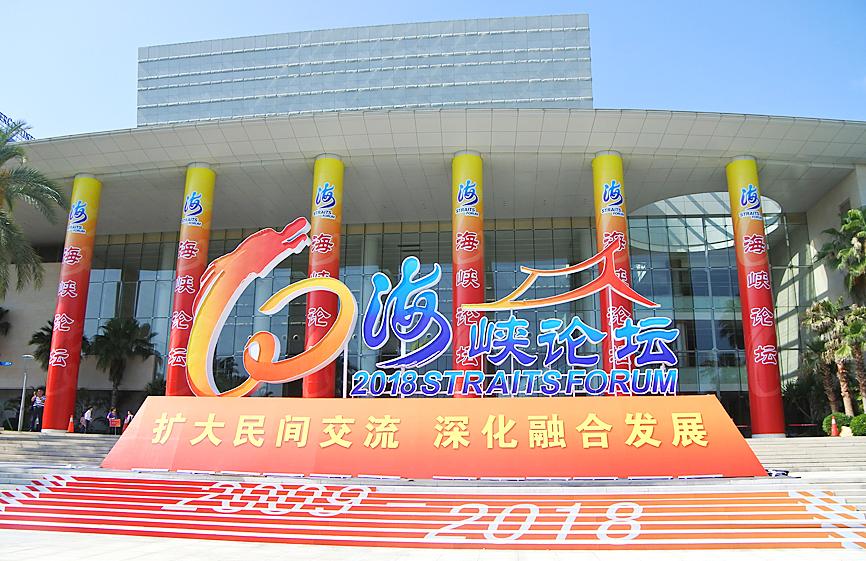Beijing plans to push its “united front” tactics during the Straits Forum set to take place today in Xiamen, China, an official familiar with cross-strait affairs said on Sunday.
The forum is the most important “united front” event leading up to the 20th National Congress of the Chinese Communist Party (CCP), scheduled for later this year.
Taiwanese students and business leaders residing in China, along with pro-China parties and pro-unification groups, have been invited to join the forum, the official said on condition of anonymity.

Photo: CNA
Chinese People’s Political Consultative Conference Chairman Wang Yang (汪洋) is scheduled to address Taiwanese delegates tomorrow, which could set the tone for the “CCP’s overall strategy for resolving the Taiwan dilemma in the new era,” he said.
A strategy toward Taiwan could be discussed, but would not be the focus at the congress, as significant victories by the Democratic Progressive Party in November’s local elections would be a setback for Chinese President Xi Jinping (習近平), he said.
China might instead announce details of a strategy in November when marking the 30th anniversary of the so-called “1992 consensus,” or in January when marking the fourth anniversary of Xi’s presentation of a “one country, two systems” model for Taiwan, he said.
Xi’s term is certain to be extended at the congress, after which he would pursue the “historical mission” of resolving Taiwan issues in a “new era,” the official said.
China’s diplomatic, military and economic oppression of Taiwan are expected to increase as it prepares for possible military force against the nation, he said.
However, Beijing’s priority is a peaceful unification and joint economic development, using platforms such as the Straits Forum to persuade Taiwanese of the benefits of cooperation, he said.
Due to travel restrictions in response to the COVID-19 pandemic, attendance at the Straits Forum is expected to be less than in past years, reducing its influence, he added.

ALIGNED THINKING: Taiwan and Japan have a mutual interest in trade, culture and engineering, and can work together for stability, Cho Jung-tai said Taiwan and Japan are two like-minded countries willing to work together to form a “safety barrier” in the Indo-Pacific region, Premier Cho Jung-tai (卓榮泰) yesterday said at the opening ceremony of the 35th Taiwan-Japan Modern Engineering and Technology Symposium in Taipei. Taiwan and Japan are close geographically and closer emotionally, he added. Citing the overflowing of a barrier lake in the Mataian River (馬太鞍溪) in September, Cho said the submersible water level sensors given by Japan during the disaster helped Taiwan monitor the lake’s water levels more accurately. Japan also provided a lot of vaccines early in the outbreak of the COVID-19 pandemic,

Kaohsiung Mayor Chen Chi-mai (陳其邁) on Monday announced light shows and themed traffic lights to welcome fans of South Korean pop group Twice to the port city. The group is to play Kaohsiung on Saturday as part of its “This Is For” world tour. It would be the group’s first performance in Taiwan since its debut 10 years ago. The all-female group consists of five South Koreans, three Japanese and Tainan’s Chou Tzu-yu (周子瑜), the first Taiwan-born and raised member of a South Korean girl group. To promote the group’s arrival, the city has been holding a series of events, including a pop-up

TEMPORAL/SPIRITUAL: Beijing’s claim that the next Buddhist leader must come from China is a heavy-handed political maneuver that will fall flat-faced, experts said China’s requirement that the Dalai Lama’s reincarnation to be born in China and approved by Beijing has drawn criticism, with experts at a forum in Taipei yesterday saying that if Beijing were to put forth its own Dalai Lama, the person would not be recognized by the Tibetan Buddhist community. The experts made a remarks at the two-day forum hosted by the Tibet Religious Foundation of His Holiness the Dalai Lama titled: “The Snow Land Forum: Finding Common Ground on Tibet.” China says it has the right to determine the Dalai Lama’s reincarnation, as it claims sovereignty over Tibet since ancient times,

Temperatures in some parts of Taiwan are expected to fall sharply to lows of 15°C later this week as seasonal northeasterly winds strengthen, the Central Weather Administration (CWA) said today. It is to be the strongest cold wave to affect northern Taiwan this autumn, while Chiayi County in the southwest and some parts of central Taiwan are likely to also see lower temperatures due to radiational cooling, which occurs under conditions of clear skies, light winds and dry weather, the CWA said. Across Taiwan, temperatures are to fall gradually this week, dropping to 15°C to 16°C in the early hours of Wednesday